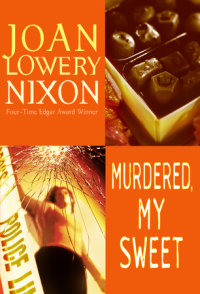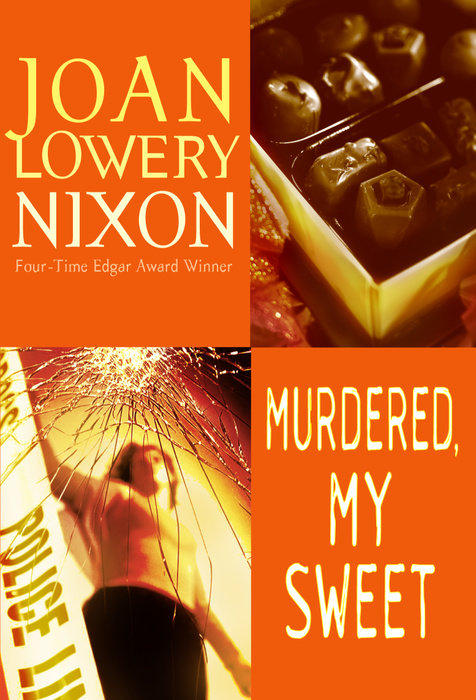Chapter One
It 's not easy being related to a woman who's famous for murdering people.
Don't get me wrong. Mom's not a real murderer. She's Madeline Jakes, the most famous mystery writer in the United States maybe the world. She's a good writer, too, I've never met anyone who could read one of Mom's novels late at night and not have to sleep with the bathroom light on.
So many people have seen Mom's picture on the back of her book jackets and watched her being interviewed on TV that they recognize her in public places. "There's Madeline Jakes!" some whisper. Some point. Maybe because they've been watching too much television, I notice some glance around to see if Mom's with the police, helping to solve a murder at that very moment.
Solve a murder? Mom? It's actually funny. My mom is a woman who half the time can't even figure out where she put her car keys or placed her glasses. She rarely remembers birthdays or doctor appointments or speaking engagements unless she's reminded, Mom has never…
Chapter One
It 's not easy being related to a woman who's famous for murdering people.
Don't get me wrong. Mom's not a real murderer. She's Madeline Jakes, the most famous mystery writer in the United States maybe the world. She's a good writer, too, I've never met anyone who could read one of Mom's novels late at night and not have to sleep with the bathroom light on.
So many people have seen Mom's picture on the back of her book jackets and watched her being interviewed on TV that they recognize her in public places. "There's Madeline Jakes!" some whisper. Some point. Maybe because they've been watching too much television, I notice some glance around to see if Mom's with the police, helping to solve a murder at that very moment.
Solve a murder? Mom? It's actually funny. My mom is a woman who half the time can't even figure out where she put her car keys or placed her glasses. She rarely remembers birthdays or doctor appointments or speaking engagements unless she's reminded, Mom has never solved a murder in her life, except for the murders in her books. Because she makes those up, she knows from the very beginning "whodunnit." I don't count them.
Try telling that to Mom. She's actually started to believe what she reads about herself, because when fans ask her about real cases she's solved, she doesn't come right out and say, "What cases? The police have never once asked for my help." Instead she smiles as though she has a big secret. She even giggles, which is really gross behavior for a forty-three-year-old woman. When I hear her murmur something about classified information, I want to . . . well, just imagine!
"If I only had the chance, Jenny," Mom said to me recently, "I know I could use my skills as a mystery writer to solve real crimes.
"Mom," I reminded her, "it's your brother who solves real crimes. Uncle Bill's a homicide detective. You're a writer. You use your imagination and your computer to give your fans stories about make--believe murders.''
Mom tapped a pencil against her nose, smiled, and gazed far away. "But if I had the chance to solve a real crime," she insisted, "I know I could."
It wouldn't have done any good to answer. I fought back the resentment that sometimes boils up and threatens to choke me when Mom goes off into her fictional world like one of her own characters. That's when, more than ever, I wish that Dad were still alive, because whenever Mom became a sailboat, Dad was there as an anchor. And sometimes I want to scream at Mom, "You're the mother, not me! You're supposed to be taking care of me! Why do I end up having to take care of you?"
Dad had been an officer in the Air Force, and we were transferred so much we were never able to make friends who were keepers. When I was little it didn't matter to me, because there were always kids around to play with, but Mom likes people and badly wanted friends, so everywhere we went she joined clubs and took classes in whatever was handy. That's how she became interested in writing. She signed up for a class in "How to Write a Mystery Novel," and found as she told us where she truly belonged.
Her books were published, but Mom didn't make much money with them for the first few years. And when Dad's plane crashed, Mom was so heartbroken I thought she'd never be able to write again. But Mom has always had courage and spunk, and one day she told me, "Jenny, if I work hard and write books that people want to read, I know that someday I can make a good life for you.
Maybe Mom knew all along that her books would be best-sellers and she'd be famous. And maybe somewhere inside her all along was the persona that blossomed overnight. A publicist advised her, "Don't go to interviews or talk shows as a pleasant neighbor-next-door. Your public wants to see a writer of mysteries. That means glamour . . . drama . . . pizzazz!"
The chiffon scarves, the drama, and the "darlings" fit Mom like a beautiful new dress. I didn't mind at first. Mom had always been filled with imagination and fun. However, her new personality has a downside. It may be that the glamorous mystery writer is no longer able to handle all the mundane, routine details of life by herself. Or maybe she enjoys leaving them behind and joining the social life of many of the famous people she meets. Whatever the reason, I end up having to do a lot of the mothering. I'm too young to be a mother especially my mother's mother but there's nothing I can do about it.
In spite of having to deal with a mother who spends much of her life in never-never land, I love my mom. I really do, even during the moments when we seem to be trying to drive each other crazy.
When Mom's not mentally off somewhere inside the story she's writing, she's fun to be with, and often, when she goes away on weekends or holidays, for autographings or to give lectures, she takes me with her. I swim in the hotel pool or lie on the beach, and eat great food. When people smile and ask me, "Do you ever help your mother solve mysteries?" I answer, "I'm the one who helps her remember where she's going so she can catch her plane on time."
They think that's a great joke. Unfortunately for me it isn't a joke.
I've always liked to read mysteries. I think it's because I love the challenge of spotting clues and figuring things out. I started reading Nancy Drews when I was seven. I soon graduated into young adult mysteries stacks and stacks of them and now I'm into some of Dad's old Raymond Chandler and John D. MacDonald stories, and Mom's Sue Grafton and Mary Higgins Clark novels.
I'm pretty good at figuring out whodunnit before the last big scene, but Mom never can. At first I thought that her mind went off in directions she'd take if she were writing the story. Or that she got sidetracked by the characters. Or that maybe she became too tangled in motives and means to recognize the crucial clue when she saw it. But I realized what the problem was when, one day, Mom showed me how she developed and put together the parts of a story.

